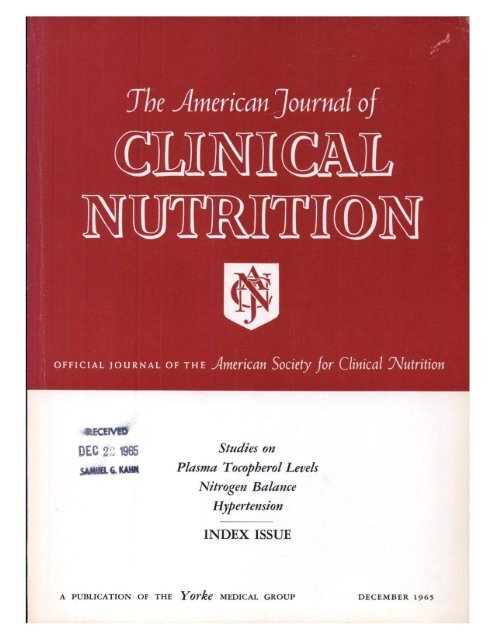评估无肥胖、血糖正常、葡萄糖耐受不良或2型糖尿病患者的免疫功能:NutrIMM研究的主要发现,这是一项单臂对照喂养试验
IF 6.5
1区 医学
Q1 NUTRITION & DIETETICS
引用次数: 0
摘要
背景:肥胖和2型糖尿病(T2D)与免疫功能障碍、感染易感性增加和免疫反应减弱有关。然而,肥胖和高血糖对免疫失调的独立影响尚不清楚,特别是在控制饮食条件下。目的:营养与免疫研究探讨肥胖和高血糖对伴有或不伴有T2D的肥胖个体免疫细胞功能、表型和全身性炎症的影响,并与血糖正常的瘦个体进行比较。方法该单臂对照喂养试验纳入112名受试者,分为4组:瘦-正常血糖组(Lean-NG)、肥胖-正常血糖组(OB-NG)、肥胖-葡萄糖不耐受组(OB-GI)和肥胖- t2dm组。参与者遵循标准化的等热量北美饮食4周。在基线和第4周采集血样。单向和重复测量方差分析评估组间差异和/或饮食影响。线性回归分析检验了血糖控制和免疫功能之间的关系。结果OB-NG组sc -反应蛋白水平较高[平均差值(MD): 4.1 mg/L;95%可信区间(CI): 1.7, 6.6], OB-GI组(MD: 3.1 mg/L;95% CI: 0.82, 5.4), OB-T2D (MD: 2.7 mg/L;95% CI: 0.3, 5.1),而OB-T2D组白细胞介素(IL)-2分泌较低(MD: -2086.4 pg/mL;95% ci: -4375.9, -37.4)。OB-T2D也表现出较高的中性粒细胞(MD: 0.7%;95% CI: 0.01, 0.12),全身免疫炎症指数(MD: 155.3;95% CI: 0.90, 309.7),系统炎症反应指数(MD: 0.58, 95% CI: 0.20, 0.97)与Lean-NG相比,naïve CD8+ T细胞比例低于OB-NG (MD: -13.7%;95% ci: -27.3, -0.14)。回归分析显示高血糖与免疫功能下降有关,特别是IL-2 (β = -0.296, P = 0.037)和干扰素分泌(β = -0.325, P = 0.017)。结论肥胖患者免疫功能受损,T2D患者免疫功能恶化,提示肥胖和血糖控制不良共同导致免疫功能障碍。解决代谢健康问题可能有助于减轻肥胖相关疾病的免疫功能障碍和炎症。本试验在clinicaltrials.gov注册为NCT04291391 (https://www.clinicaltrials.gov/study/NCT04291391?term=NCT04291391&rank=1)。本文章由计算机程序翻译,如有差异,请以英文原文为准。
Assessment of immune function in individuals without and with obesity and normoglycemia, glucose intolerance, or type 2 diabetes: primary findings of the NutrIMM study, a single-arm controlled feeding trial
Background
Obesity and type 2 diabetes (T2D) are associated with immune dysfunction, increasing infection susceptibility and impairing immune responses. However, the independent effects of obesity and hyperglycemia on immune dysregulation remain unclear, particularly under controlled dietary conditions.
Objectives
The Nutrition and Immunity study investigated the effects of obesity and hyperglycemia on immune cell function, phenotype, and systemic inflammation in individuals with obesity with or without T2D, compared with lean individuals with normoglycemia.
Methods
This single-arm controlled feeding trial included 112 participants across 4 groups: lean-normoglycemic (Lean-NG), obese-normoglycemic (OB-NG), obese-glucose intolerant (OB-GI), and obese-T2D. Participants followed a standardized isocaloric North American diet for 4 wk. Blood samples were collected at baseline and week 4. One-way and repeated measures analysis of variance assessed group differences and/or dietary effects. Linear regression analyses examined associations between glucose control and immune function.
Results
C-reactive protein levels were higher in the OB-NG group [mean difference (MD): 4.1 mg/L; 95% confidence interval (CI): 1.7, 6.6], OB-GI group (MD: 3.1 mg/L; 95% CI: 0.82, 5.4), and OB-T2D (MD: 2.7 mg/L; 95% CI: 0.3, 5.1) compared with Lean-NG, whereas interleukin (IL)-2 secretion was lower in OB-T2D group (MD: –2086.4 pg/mL; 95% CI: –4375.9, –37.4). OB-T2D also exhibited higher neutrophils (MD: 0.7%; 95% CI: 0.01, 0.12), Systemic Immune-Inflammation Index (MD: 155.3; 95% CI: 0.90, 309.7), and system inflammation response index (MD: 0.58, 95% CI: 0.20, 0.97) compared with Lean-NG, and a lower proportion of naïve CD8+ T cells than OB-NG (MD: –13.7%; 95% CI: –27.3, –0.14). Regression analysis showed an association between hyperglycemia and reduced immune function, particularly for IL-2 (β = –0.296, P = 0.037) and interferon-gamma secretion (β = –0.325, P = 0.017).
Conclusions
Immune function is compromised in obesity and worsens in T2D, suggesting both obesity and poor glucose control drive immune dysfunction. Addressing metabolic health may help mitigate immune dysfunction and inflammation in obesity-related conditions.
Trial registration number
This trial was registered at clinicaltrials.gov as NCT04291391 (https://www.clinicaltrials.gov/study/NCT04291391?term=NCT04291391&rank=1).
求助全文
通过发布文献求助,成功后即可免费获取论文全文。
去求助
来源期刊
CiteScore
12.40
自引率
4.20%
发文量
332
审稿时长
38 days
期刊介绍:
American Journal of Clinical Nutrition is recognized as the most highly rated peer-reviewed, primary research journal in nutrition and dietetics.It focuses on publishing the latest research on various topics in nutrition, including but not limited to obesity, vitamins and minerals, nutrition and disease, and energy metabolism.
Purpose:
The purpose of AJCN is to:
Publish original research studies relevant to human and clinical nutrition.
Consider well-controlled clinical studies describing scientific mechanisms, efficacy, and safety of dietary interventions in the context of disease prevention or health benefits.
Encourage public health and epidemiologic studies relevant to human nutrition.
Promote innovative investigations of nutritional questions employing epigenetic, genomic, proteomic, and metabolomic approaches.
Include solicited editorials, book reviews, solicited or unsolicited review articles, invited controversy position papers, and letters to the Editor related to prior AJCN articles.
Peer Review Process:
All submitted material with scientific content undergoes peer review by the Editors or their designees before acceptance for publication.

 求助内容:
求助内容: 应助结果提醒方式:
应助结果提醒方式:


